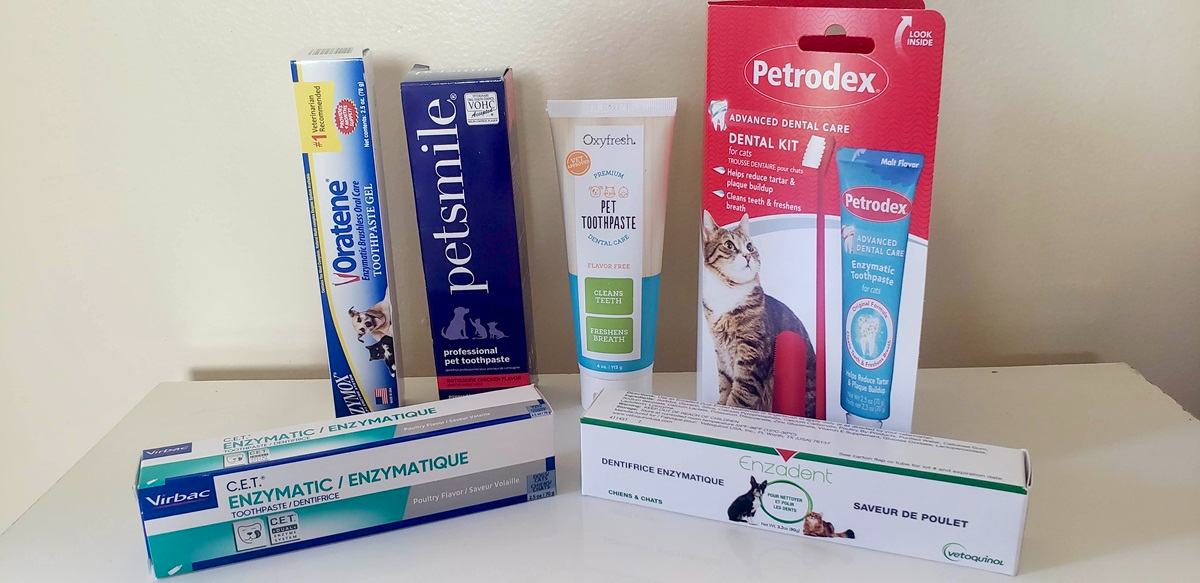
The best cat toothpaste will have effective ingredients and appeal to feline palates. Liz Coleman / Cats.com
Dental hygiene is often overlooked by cat parents. We get it—the majority of cats aren’t thrilled about having their mouths handled, and most aren’t exactly cooperative with the process. But even though it’s challenging, regular brushing can save you from expensive dental treatments later on. One way to make the experience more tolerable for your cat is to find a toothpaste they enjoy—or at least tolerate.
To that end, we’ve combed the market to bring you six effective cat toothpastes that are popular with pet parents and their cats. Since every cat owner will have slightly different criteria in mind, we’ve categorized our recommendations to suit a range of needs. Keep reading for the best cat toothpastes for polishing teeth, freshening breath, and maintaining good oral health.
At a Glance: Best Dental Toothpaste To Buy In 2024
Want a quick look at the products reviewed in this article? In the comparison table below, we’ve highlighted some of the most important features of each product. You’ll find more detailed information about each product later in the article.

Petsmile Professional Pet Toothpaste
- VOHC Seal of Approval
- Doesn’t contain sorbitol
- Proprietary formula breaks down plaque and bacteria

Vetoquinol Enzadent Enzymatic Dog & Cat Toothpaste
- Triple-enzyme formula
- Calcium pyrophosphate prevents tartar
- Zinc gluconate has antibacterial properties

Oxyfresh Premium Pet Toothpaste
- Doesn’t contain sorbitol
- Minimal ingredients
- Infused with aloe and chamomile to soothe gums
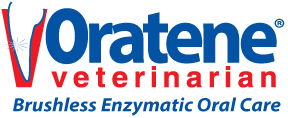
Oratene Enzymatic Brushless Toothpaste Gel
- Contains enzymes to break down plaque and manage bad breath
- Provides antibacterial, antifungal, and antiviral protection
- Designed to relieve dryness, irritation, inflammation, and redness without causing salivation

Virbac C.E.T. Enzymatic Dog & Cat Toothpaste
- Available in beef, malt, poultry, seafood, and vanilla mint
- Dual-enzyme system inhibits plaque
- Good choice for multi-pet homes, as it’s suitable for both cats and dogs

Sentry Petrodex Veterinary Strength Enzymatic Dental Kit
- Formulated specifically for cats
- Most cats like the taste
- No foaming agents
Why It’s Important To Brush Your Cat’s Teeth
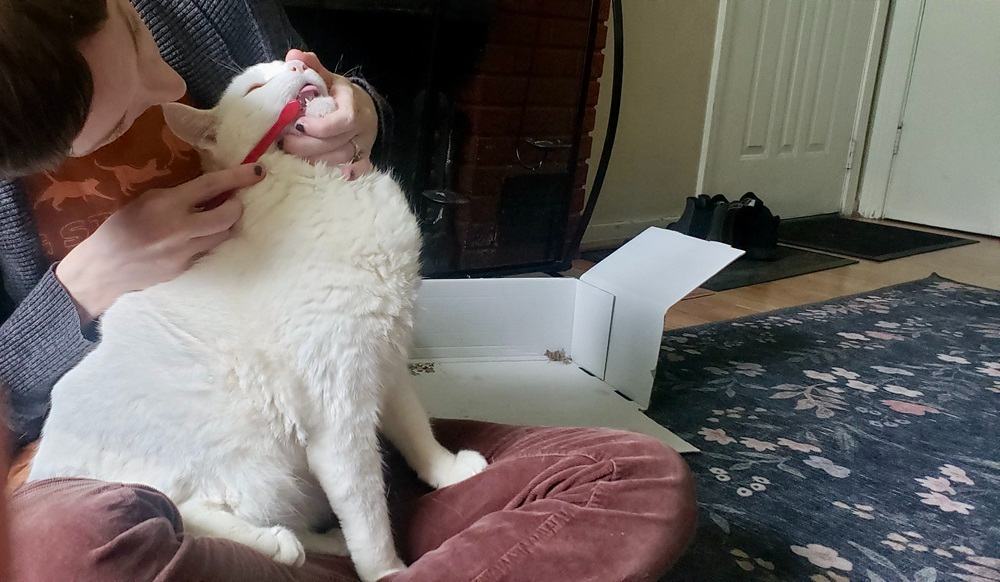
Regular teeth brushing contributes to better overall health. Liz Coleman / Cats.com
It’s quite common for cats to suffer from dental disease, with 50% to 90% oexhibiting signs by the age of 4. Unfortunately, since cats can’t communicate when something is wrong, it often goes unnoticed.
Although pet food manufacturers often claim that dry cat food helps clean teeth, it’s not enough to remove plaque and tartar that can lead to gingivitis. And while dental treats and water additives can help, they’re not a suitable replacement for regular brushing.
Ignoring dental disease can introduce a host of problems for your cat. For one, it can cause severe pain and inflammation, making it difficult for your cat to eat and drink. Additionally, bacteria might enter the bloodstream, causing systemic infection. In serious cases, dental disease can necessitate the removal of some of your cat’s teeth.
To protect your cat’s dental health, it’s best to brush their teeth regularly with a cat-specific toothpaste. If your cat is initially wary, there are also antiseptic gels and rinses that can help in the meantime. These products won’t be as effective as toothbrushing, but they’re better than nothing.
Why Trust Cats.com
Before making my product selections, I read up on periodontal disease in cats and preventative care recommended by veterinary professionals. I also researched common ingredients in cat toothpastes and how they work. I compared these to the ingredients found in some of the most popular formulas on the market.
Since it’s important that a toothpaste is at least tolerated by your cat, I read dozens of customer reviews and searched Reddit to learn what formulas other cats actually liked. During testing, I examined the texture and smell of each toothpaste. I also let my two cats smell and taste each one to determine which were the most appealing and which were not.
Our rankings are determined by a variety of factors. Each cat will have different needs and preferences, so while Petsmile is our top choice, it might not be ideal for your unique cat. To help you choose the right toothpaste for your cat, we’ve broken down our recommendations by the type of formula, value, and other key considerations.
What To Consider When Buying Cat Toothpaste
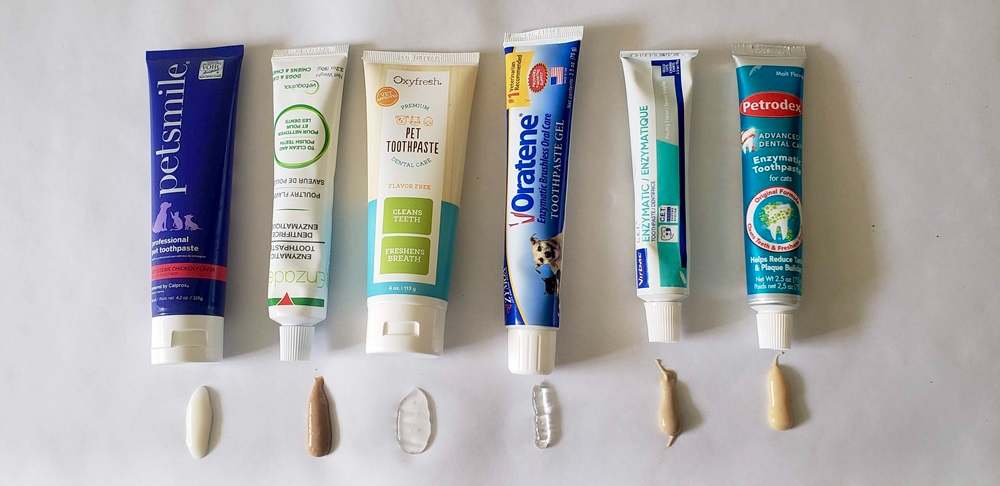
Cat toothpastes come in a range of textures and flavors. Liz Coleman / Cats.com
You want a toothpaste that’s both effective against plaque and appealing to your cat. Here are some things to keep in mind while you shop.
Flavor and Texture
To entice your cat and make brushing more of a treat than a dreaded chore, choose a toothpaste flavor that your cat enjoys. As obligate carnivores, most cats will be interested in meat-flavored formulas (gross, I know, but they like it!).
Pet toothpaste also comes in a range of textures, from thick and pasty to thin and gel-like. Different textures will appeal to different cats. As we all know, cats are particular creatures, so it might take some trial and error to land on the right one.
Ingredients
Since they can’t spit out their toothpaste the way humans do, cats require a species-specific formula that’s safe to swallow. Toothpaste made specifically for cats is meant to be ingested and will leave out harmful ingredients commonly found in human toothpaste, like baking soda and fluoride. It also excludes foaming agents.
For plaque-busting power, look for enzymes, which often end with “-ase.” Some common ones include glucose oxidase, mutanase, dextranase, lysozyme, and lactoperoxidase. Abrasive ingredients like silica can help polish teeth. And antibacterial ingredients help fight bad breath.
Sorbitol is a confusing ingredient that’s found in many cat toothpaste formulas. In limited amounts, it doesn’t seem to cause problems. But if your cat is prone to digestive issues, you might want to avoid it.
Application Method
Traditional brushing is the gold standard of pet oral care, but some sensitive cats might benefit from a brushless formula. Brushless formulas can be applied directly to your cat’s gums and teeth. These are usually a thicker gel that clings to the teeth to fight periodontal disease without friction.
Frequently Asked Questions
Is it OK to use human toothpaste on cats?
No, cats need a species-specific toothpaste. Human toothpastes contain ingredients that can cause digestive upset, like fluoride, sodium, and detergents. Not to mention, the minty flavor will be highly unpalatable to most cats.
Can I brush my cat’s teeth with baking soda?
There is some debate on the topic, but we advise against it. Not only does it taste bad, but baking soda is alkaline and can cause an upset stomach.
Do cat dental treats work?
Cat dental treats can certainly help, but they’re not a suitable replacement for traditional brushing.
What if my cat hates having their teeth brushed?
This is not uncommon. Most cats don’t like having a brush forced into their mouth! The key is to proceed gently and slowly. Acclimating your cat to teeth brushing can take time, so don’t fret if it’s slow-going at first.
Take one step at a time, letting your cat get used to having their mouth handled and trying the toothpaste on your finger before introducing the brush. Keep sessions short and offer lots of praise and treats. If your cat is still resistant, try adding other oral care strategies to your routine, such as water additives, dental treats, and chew toys.
-
https://www.vet.cornell.edu/departments-centers-and-institutes/cornell-feline-health-center/health-information/feline-health-topics/feline-dental-disease
-
https://www.cabidigitallibrary.org/doi/pdf/10.5555/20063121295
-
https://vohc.org/accepted-products/#cats
-
https://pubmed.ncbi.nlm.nih.gov/33247264/
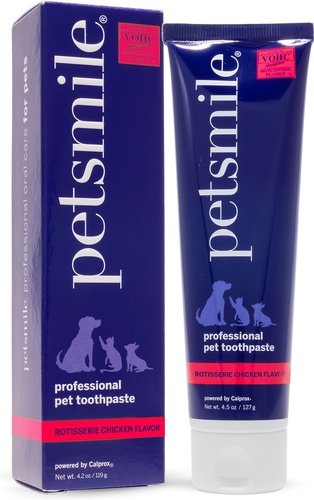
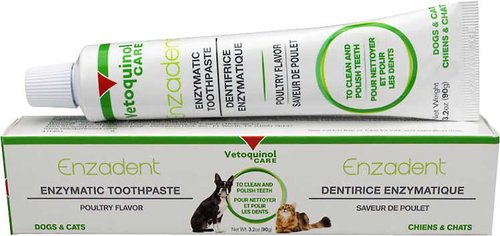
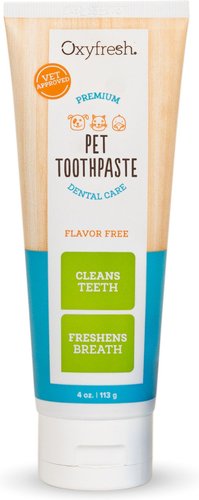

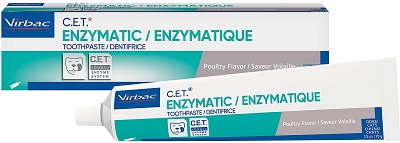
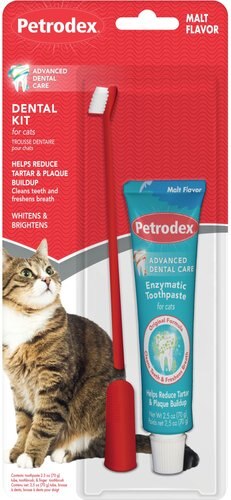
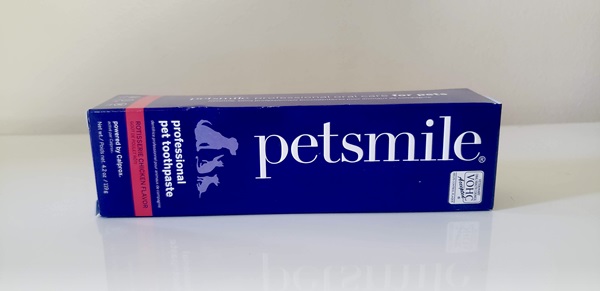
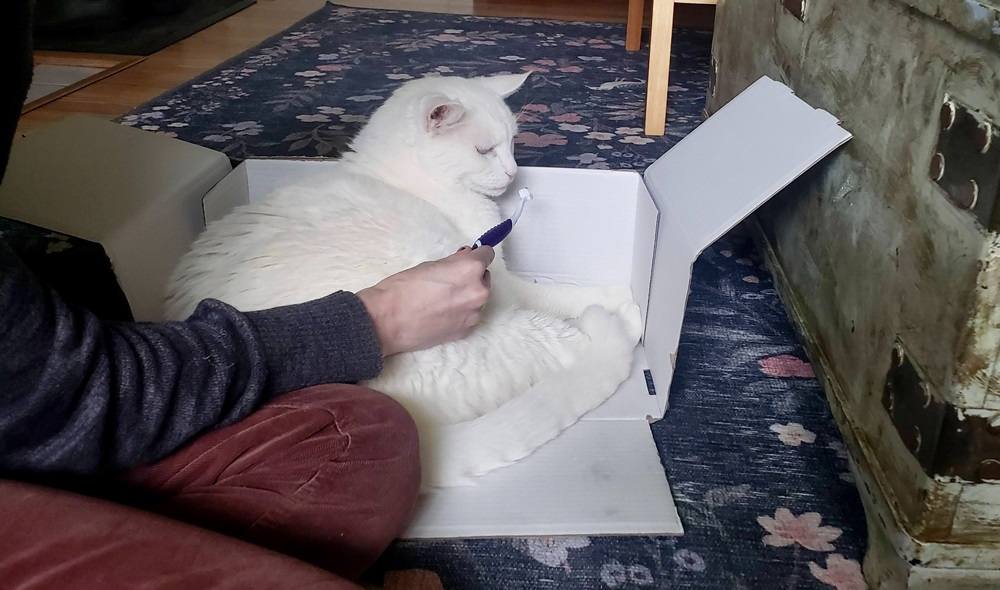
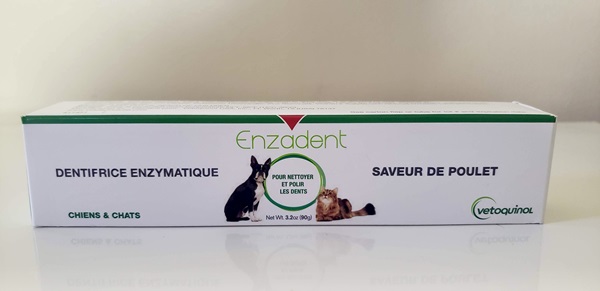
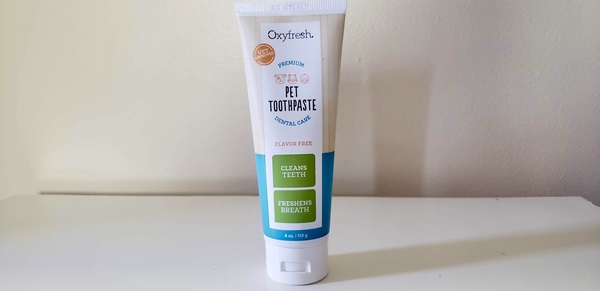
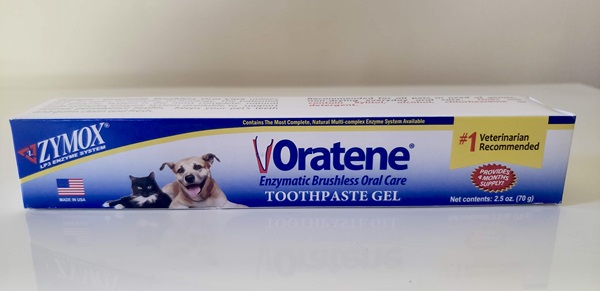
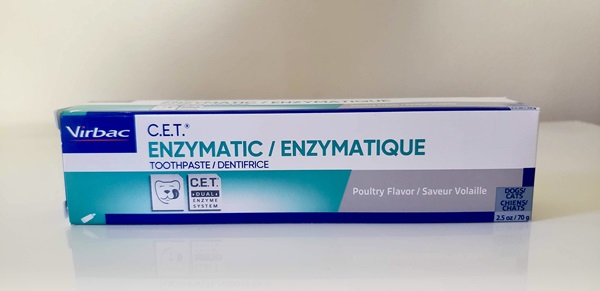
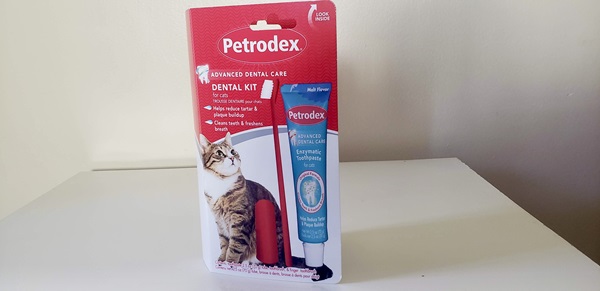
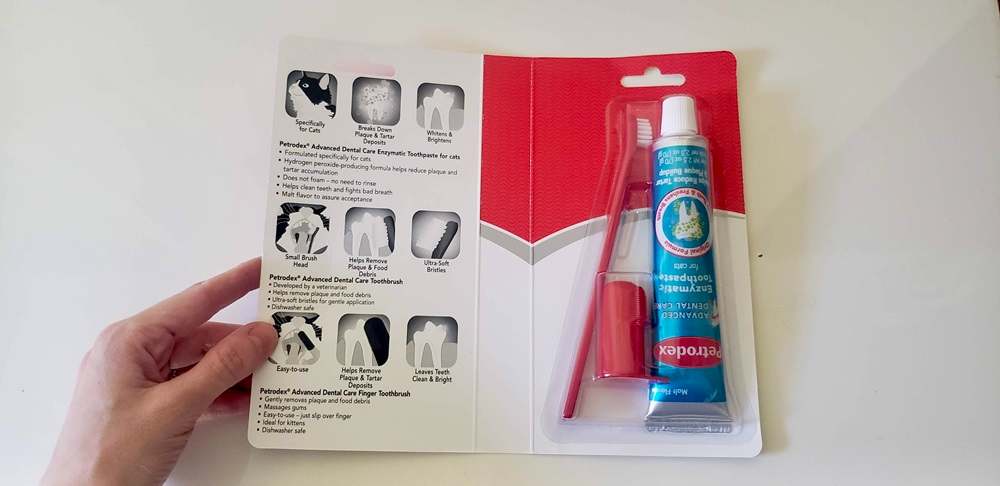
All of these products contain Sorbitol which is essentially sugar (sugar alcohol to be exact). Most of them even list Sorbitol as the first ingredient. Isn’t this bad for the cat’s heath? Especially considering that they will be swallowing this and we are supposed to brush their teeth couple times a week at least.
Hi Charlie, good point. It does appear that sorbitol is safe in small quantities, but it’s hard to say how it may affect cats’ health over time. The primary concern with sorbitol is its effect on digestion—it can make food move more quickly through the digestive tract and may cause diarrhea. This doesn’t seem to be something that will build up over time, however, so if your cat seems able to tolerate it in the short-term, avoiding a sorbitol-based toothpaste for this reason doesn’t make much sense. The other concern is that it may cause problems for cats with diabetes. Overall, it’s an ingredient to approach with caution, but we don’t know enough to say whether or not it’s a hazardous inclusion in your cat’s toothpaste.
I would like to know options for cat toothpastes that do not contain sorbitol
Hi Eric, thanks for commenting! I know we went over this by email, but Petsmile is a good option that doesn’t contain sorbitol and which seems to be one of the best-performing options on the market. All the best!
Sorbitol gives my 8 month old kitten diarrhea any time I use these to brush her teeth. Even if I take a break and then only use it one night, she will have loose stools the next day. Any recommendations for good toothpastes without Sorbitol?
Hi Jenn, Petsmile toothpaste doesn’t contain sorbitol: https://www.amazon.com/Petsmile-Professional-Toothpaste-Human-Grade-Ingredients/dp/B0988DB9PP/?tag=wwwallabou001-20
My Kitty, Aubree will NOT use ANY of the toothpastes. So I have been brushing, and following this up with the dental cloth/wipes.
I am also incorporating the powder into her canned/wet food. Any other thoughts on how to give her the optimum in Oral Hygene?
Hi Marilee, besides what you’re already doing, there are a few things you can do to ensure that Aubree has good dental hygiene. One is taking her in for professional cleanings to remove any lingering plaque, and most importantly, tartar. Additionally, you might consider feeding her some raw meaty bones. Compared to wet food, these take more effort to eat and can help to remove dental buildup. Raw feeding is controversial and complex; you won’t want to feed raw if she is immunocompromised, and it’s important to make sure that the bones are fairly small. Remember that cats can safely eat the bones of mice, lizards, chipmunks, and other small prey animals, but larger bones from pork or beef may pose a risk. Again, this is a relatively controversial area, so you may want to consult your veterinarian before incorporating raw bones into her diet. Hope this helps!
Hello, I currently use C.E.T virbac toothpaste for my FIV+ cat. But I recently read that Sodium benzoate, Dicalcium Phosphate Anhydrous, and
Potassium Thiocyanate are all harmful to cats. And that the two enzymes in it (Glucose Oxidase, Lactoperoxidase) are not tested on pets and work well in humans, but could be harmful for cats. I read that sodium benzoate is safe for dogs, but not cats. And dicalcium phosphate anhydrous causes kidney stones and organ issues that could kill a cat. I do not know what to do or what toothpaste to use. Is a natural homemade one better? I am also concerned about the purified water because I heard that is bad for cats. And is the poultry digest safe? I’m unsure what that is.
Hi George, thanks for the comment, and nice work reading up on this. Frankly, I’m not a vet or veterinary nutritionist, and I can’t give definitive answers on all of this. But I will say that while some of these can be harmful in certain quantities or under certain circumstances, I haven’t seen enough evidence to think that the amounts used in common toothpaste products for cats will be harmful. Dicalcium phosphate is one I’ve recently had to address with a veterinarian working on staff at a pet food company, and they say that “dicalcium phosphate supplies calcium and phosphorus, 2 essential minerals, to the food. Extremely high levels of calcium in the blood can lead to calcification of tissues and renal disease, this is seen with vitamin D toxicity because of the mechanisms within the body. Added at an appropriate level to make sure the calcium and phosphorus meet the AAFCO minimum required nutrient levels without exceeding the maximum levels is not going to lead to health issues in an otherwise healthy pet.” They add that “If you google pretty much any mineral ingredient that is used in pet food, you will find warnings because the information is not specific to proper inclusion levels.” Regarding those enzymes, cats produce their own lactoperoxidase, just like humans and other animals do, so that’s promising, but glucose oxidase does remain a mystery. However, the products including these ingredients do appear to have been tested and found both effective and safe, so I wouldn’t be too concerned. Poultry digest should be safe, yes—it’s a product made from hydrolyzed poultry tissue. The proteins are broken down and concentrated for intense flavor.
My vet directed me to the Veterinary Oral Health Council website for recommended products – https://vohc.org/accepted-products/ Wondering what you guys think of these? Will you guys review any of these?
Great question, Jesus! We’ve covered some of the VOHC-approved treats here: https://cats.com/best-dental-cat-treats and one of the prescription dental diets here: https://cats.com/best-foods-for-cats-with-dental-disease. I’m not familiar with the Healthymouth gels and water additives, though, so I’ll see if we can schedule a review!